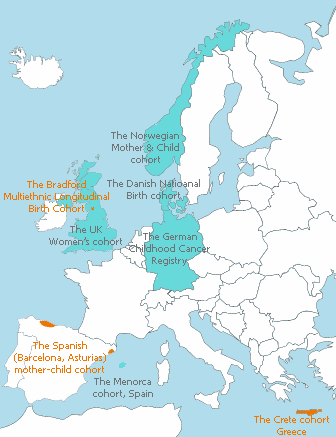The NewGeneris cohorts and biobanks – towards a pan-European mother-child cohort
NewGeneris uses samples and data from 5 existing European cohorts and biobanks, while it is developing an additional 3 new cohorts. Between them, these cohorts represent a total of around 300,000 mother-child pairs, coming from regions with a wide diversity of environmental conditions and dietary and lifestyle habits and constitute in effect a virtual European birth mega-cohort.

| |
Existing cohorts & biobanks |
| |
New cohorts & biobanks |
Existing Cohorts and biobanks
The Norwegian Mother and Child cohort study (MoBa study)
This nationwide cohort is currently (mid-2006) half way to its aim to recruit 100 000 pregnant women. Mothers answer 3 questionnaires during pregnancy and 4 after childbirth (upto the child reaching 6 years of age). The biobank contains whole blood, serum and plasma, and urine from mother and father at approximately 17 weeks pregnancy, DNA from both parents and cord blood from birth.
The Danish National Birth Cohort (DNBC)
During 1996-2002, 101,046 Danish pregnant women from all over Denmark were recruited into this cohort. Information on lifestyle, diet and other factors was collected in weeks 6-10 of gestation, while 4 computer-assisted telephone interviews of the women in gestation weeks 12 and 30, as well as when the children were 6 and 18 months old. An extensive Food Frequency Questionnaire was administered to the women around gestation week 25. The bio-bank contains 2 blood samples taken from the mother around week 6 and 12 of gestation, in addition to a blood sample taken from the umbilical cord at birth. PKU cards for from all newborns are also available.
UK Women’s Cohort Study
This cohort was established in 1994 and contains details of food intake, cooking practises and lifestyle on over 35,000 women chosen to represent a wide range of dietary patterns with current mean age 60 years. There are over 63,000 children of the cohort women, with mean current age 35 years, of whom about 120 will have had cancer aged under 15 years. Maternal dietary exposures to genotoxic and immunotoxic chemicals will be related to cancer incidence in their children, with childhood cancer a particular focus. In the context of NewGeneris the study will be limited to an analysis of exposure correlated with birth weight and the presence of any congenital abnormalities.
The Menorca cohort, Spain
The Menorca cohort enrolled all births in the island of Menorca in 1997. Dietary questionnaires and blood samples were collected, and the children (n=462) have been followed annually. Outcome parameters have focused on asthma, allergies and neurodevelopment. Blood samples have been analyzed for specific IgEs, thyroid hormones, and metals. Blood samples from the mother and cord blood are available.
The German Childhood Cancer Registry
The German Childhood Cancer Registry (GCCR) has been in operation since 1980 and covers all of Germany Its current population basis is 13 million children, and so far more than 35,000 cancer cases are registered. Blood DNA samples have been stored together with clinical data on cancer patients. In the context of NewGeneris, blood DNA from lymphoma and leukaemia patients diagnosed before age 5, and corresponding health controls, will be analysed for genetic polymorphisms.
New cohorts and biobanks
NewGeneris will initiate and expand 3 new cohorts in the UK, Spain and Greece. If necessary, further cohorts may be set up, preferentially in Eastern European countries. Standardised protocols for subject, data and sample selection will be employed. The currently planned cohorts are:
The Bradford Multi-ethnic Longitudinal Birth Cohort, UK
Twenty percent of Bradford’s population of 500,000 people are of South Asian origin, having over 50% of the 6,000 babies born each year. Thus this study will capture the changes and adaptations from traditional diets and cooking techniques of developing countries of origin to the more affluent and varied European diet. All newborn babies and their parents will be recruited to the study over a period of 22 months that will provide a subsequent cohort over two school years. This will provide a study population of 10,000 children based on 80% recruitment.
The Greek cohort
The cohort will enrol all births within specific urban and rural areas of the island of Crete in two years (n=6,000). Information will be collected on lifestyle factors, occupational and environmental exposures and nutrition that are predominantly based on Mediterranean diet. Follow-up will combine computerised archives with active contacts.
Spanish general population mother-child cohort (INMA study)
The INMA (INfancia y Medio Ambiente; Spanish for Environment and Childhood) is a population based cohort study in different Spanish cities that focuses on prenatal environmental exposures and growth, development and health from early foetal life until childhood. It will include 3,000 pregnant women from two areas of Spain (Sabadell-Barcelona and Asturias). During the prenatal period, extensive background information will be collected through direct interviews, and maternal blood and cord blood will be collected. The infants will be followed closely from birth to year 4.